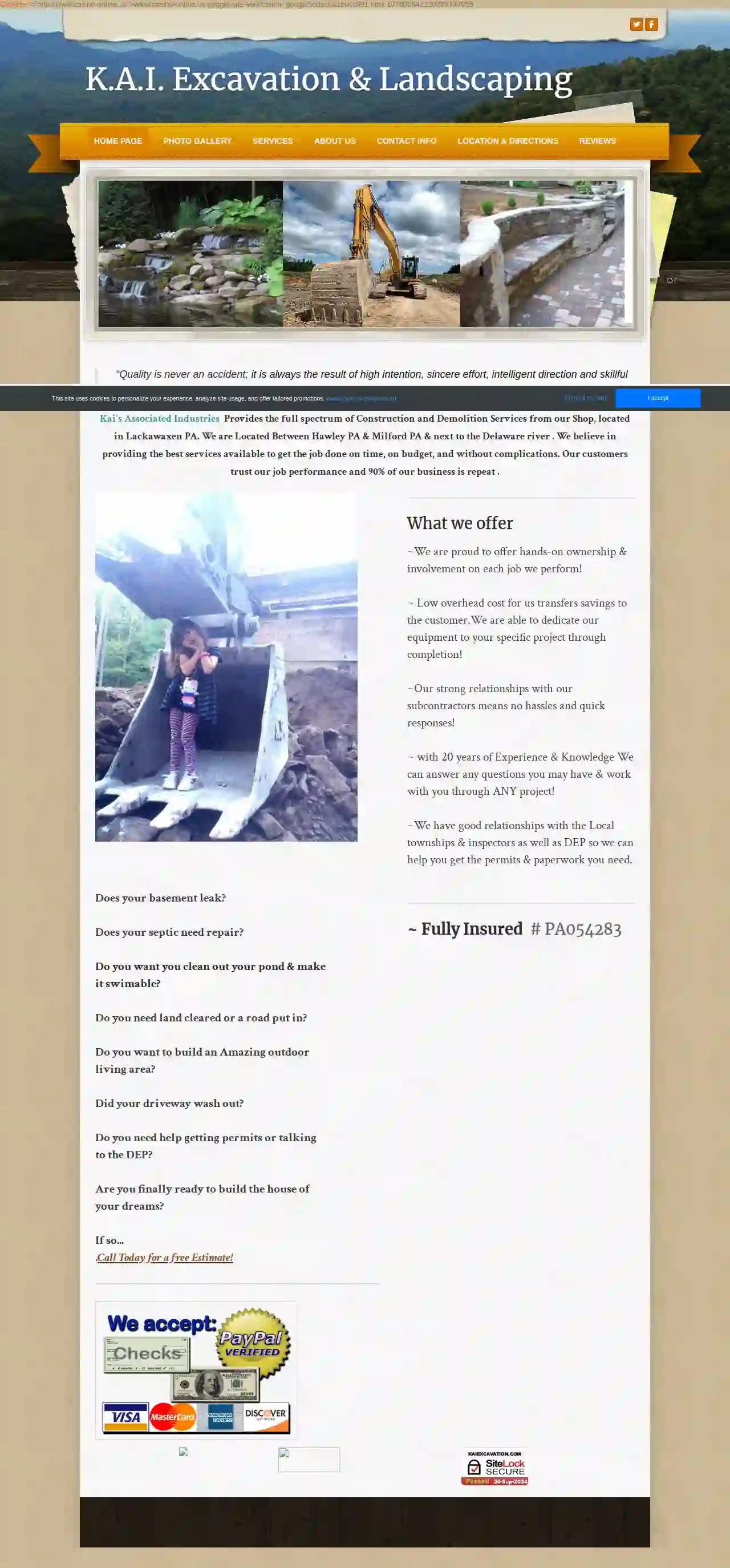Excavation Contractors London Grove
Best Excavation Contractor in London Grove
Receive multiple Excavating Contractor quotes for your project today! Compare profiles, reviews, accreditations, portfolio, etc... and choose the best deal.

K.A.I. Excavation & Landscaping
4.423 reviewsLackawaxen, USAbout Kai Wicksnes /Owner Operator When did you start your business? I started working in the landscaping /Excavation field right out of High School in 1995. I worked with Heavy Equipment since I was old enough to reach the lever's & Petals. My Best Friend Growing up had a Father in the Excavation business and I learned a lot from him at a very young age. I also came from a long line of hard working men with good work ethics. My dad taught me that learning new trades and learning about the Land was crucial to being a well rounded man. I had a natural proclivity and passion for Excavating & Landscaping since I was a young boy. Before I had my drivers licence neighbors would see me driving my bike with a cart behind it carrying a lawn mower, gas & a rake in tow. Soon I had a small business in the neighborhood and it has grown into what it is today. I have always loved seeing the end result of my work. It gives me great pride to take an area so rough & tumble & make a beautiful waterfall with a pond with free land to run on. What makes you different than other similar businesses in your community? I live in the area that I work ,so I do the best work possible to keep my clients(who are usually my neighbors) happy. I like to drive past a job I did and see kids running in the lawn I created or people sitting around a stone fireplace I built. It is very important to me to continue building a top notch business for my children to someday run. I want Kai's Associated Industries to be known for our great customer service & excellent work. I also have a lot of my own land so I get the majority of my materials right from my property. I am able to REUSE a lot of resources such as tree stumps which we bury until they biodegrade back into the soil. Being very cautious with any land & it's animals, I consider all option's while clearing a large portion of forest. We are a small family business with a big presence With over 20 years of experience & am very knowledgeable about what I do. I am now building a family who is also into landscaping & excavating. From creating landscapes, to operating machinery, to advertising, and book work. I am looking forward to my children working with me & continuing the well established business I poured my heart and soul into. I am a firm Believer that a Family that works together, Stays together . I look forward to see
- Services
- Why Us?
- Gallery
Get Quote
Smith Excavating LLC
521 reviewsHarrisburg, 62946, USExcavation Services When the people in our community need the expertise and professional oversight of an excavation contractor, they know to contact Smith Excavating LLC. Whether you need someone to clear the land on a worksite, dig out a pond, or excavate for a home foundation, we can help you. Homeowners and skilled builders alike look to us for all their excavating needs—and the reasons why are obvious. Whether you’re most concerned with quick turnarounds, reasonable rates, or excellent results, you will surely love our approach to excavation. Book our services today for your upcoming project. Call (618) 499-2594 to schedule your consultation. Making Excavation Look Easy We are high-demand excavation contractors. Not a day goes by where we are not doing earthwork, digging trenches, or aiding the development of a new property. Over the years, we have come to understand the finer points of excavation better than the rest. We Serve the Customer We work in accordance with the standards of our trade, make no mistake. That said, we also believe in serving the customer every step of the way. We will listen to your requests, answer your questions, and address any concerns you might have. In the end, you get quality results and a customer experience like no other. Ready for Every Excavation Project Do you want to dig out a pond in the backyard of your home? Are you looking to clear a piece of property of large rocks and other masses? We can help you. Between our unparalleled expertise and vast storehouse of equipment, we can undertake just about any excavation project. Some of the services we offer include: Basement excavation Pond digging and filling Site clearing Trenches and troughs Foundation digging Grading And more Aiding Residential and Commercial Excavation Projects Since our company’s inception, we have had the opportunity to assist in projects of all varieties, from home building to commercial landscaping and everything in between. We tackle projects of all sizes—and what’s more, we treat every project with the seriousness it deserves. Would you like to learn a little more about us? Call our offices today.
- Services
- Why Us?
- Testimonials
- Gallery
Get Quote
Fischer Brothers Excavating
519 reviews712 Drinker Turnpike, Covington Twp, 18424, USWelcome to Fischer Brothers Excavating, a small company providing residential and commercial heavy equipment services to Moscow PA and surrounding areas since 2004. Robert and Jeff, both graduates of North Pocono High School, take great pride in serving their community. We are a family-owned business, and all of our work is performed by owners Robert and Jeff. We make our best efforts to answer every phone call, and most calls are returned the same day. If you have a job that requires excavation services, we will take the time to discuss your project with you to determine if we are able to help. If we are able to help, we will give you an estimated cost for your work. We offer a wide range of services, including delivery, excavating, drainage, septic systems, basement water proofing, foundation repair, utilities, grading, snow removal, and specialty services. We are licensed, certified, and insured, and we provide excavation services to areas within a 30-mile radius of Moscow, Pennsylvania.
- Services
- Why Us?
- Our Team
- Gallery
Get Quote
Big Horn Excavating LLC
Lykens, PA, 17048, USExcavation Company It doesn’t matter whether an excavation job is straightforward or complex, every project could benefit from professionalism—and that is why so many people look to Big Horn Excavating LLC when they are in need. Offering exceptional excavation services, we are the contractors that set big projects in motion. We work alongside landscapers, homeowners, and general contractors on a regular basis. So whether you are looking for someone to prepare a site for basement construction or dredge silt and muck from a community pond, we are the ones you can count on. Skilled in All Excavation Services We pride ourselves on our versatile nature. Our contractors might find themselves offering services to aid in installing a stormwater drain one day, only to be excavating earth and topsoil for a backyard pond the next day. Some of the additional excavation services we offer include: Earth moving Grading Rock removal Basement excavation Site preparation services And more With so many services at your disposal, you will never have to look to another excavation team ever again. Reach out to us today to learn more about the services we offer. All the Excavation Equipment Needed Every excavation project is different. Thankfully, we are always prepared for whatever obstacle comes our way. Between our years of experience and vast storehouse of equipment, our accredited team always rises to the occasion. We move mountains for our clients—along with topsoil, earth, rock, and debris. When your upcoming project calls for an excavator, look to us. Serving the Entire Community We deliver grading and excavation solutions for industries and individuals of all distinctions. Some of the professionals we commonly work with include: Real estate developers Municipal construction operations Engineers Architecture firms General contractors Utility companies Our versatile nature allows us to envision the entire scope of our client’s construction projects. In doing so, we lay the best foundation possible for all the work to come. If you would like to learn more about our services, please feel free to contact our offices at your convenience. Excavation and Excellent Customer Service When it comes to your construction projects, you only want professionals on site. Rest assured, you will absolutely love our professional yet personable approach to excavation. We are always happy to answer your questions and address any concerns you might have.
- Services
- Why Us?
- Gallery
Get Quote
Blue Top Construction Inc. - Excavating Contractor, Erosion Control, Waterway Construction
51 reviewsOffice located in Champaign County IL, Champaign, USBlue Top Construction Inc. - Your Trusted Partner for Land Improvement Blue Top Construction Inc. is a locally owned and operated company with a rich history in the construction industry. We've been serving the Champaign County, IL area since 2005, providing reliable and experienced services to both residential and commercial clients. Our team is dedicated to delivering measurable value to your project benchmarks, ensuring your satisfaction is always our top priority. We understand that land improvement projects can be complex and require a skilled and experienced team. That's why we offer a comprehensive range of services, including: Excavating Grading Demolition Building site preparation Erosion repair Drainage solutions Material placement Seeding Tree removal Whether you need help with a new building site, waterway, surface drain, open ditch, or pond, we have the expertise and equipment to handle your project efficiently and effectively. We are committed to providing you with the highest quality workmanship and exceptional customer service. At Blue Top Construction Inc., we believe in building strong relationships with our clients. We take the time to understand your needs and goals, and we work closely with you throughout the entire project to ensure your complete satisfaction. Contact us today to discuss your land improvement project and let us help you bring your vision to life.
- Services
- Why Us?
- Gallery
Get Quote
William Lawrence Excavating & Trucking
4.36 reviewsScranton, USAbout William Lawrence Excavating & Trucking William Lawrence Excavating and Trucking Company is a locally owned and operated business serving both residential and commercial clients in Montrose, PA for over 35 years. We take pride in our modern and well-maintained equipment, operated by a qualified, courteous, and reliable crew. Our commitment to safety is reflected in our fully insured operations. Whether you're planning a large or small project that requires excavating or trucking services, we offer free assistance in the planning stage and a free evaluation to help you find the most cost-effective methods available. We believe in delivering exceptional service and ensuring your project is completed to the highest standards. At William Lawrence Excavating & Trucking, we stand by our motto: "If We Start It…We Complete It!"
- Services
- Why Us?
- Gallery
Get Quote
Skiles Excavating, Inc.
46 reviews71 Smith Road, Newville, 17241, USSkiles Excavating: A Legacy of Precision and Community Skiles Excavating began its journey like many other successful excavating companies—with a single individual, James Skiles, who brought with him over 20 years of equipment operating experience, a backhoe, and an ambitious dream. In 2006, he created a business that would not only shape a better life for his family but also excel in the excavation industry. Since then, we’ve made significant strides, building strong relationships with electrical contractors while undertaking excavating projects for underground utilities and concrete work. Our services quickly expanded to include plumbing excavation and small site projects, enabling us to diversify our expertise. In 2018, we achieved the milestone of incorporation in Pennsylvania and are now proud to have a dedicated team of over 30 skilled employees. Our commitment to excellence and solid partnerships with contractors are the cornerstones of our success. One of our core values at Skiles Excavating is "Giving Back to the Community"— 1st Annual Shippensburg Pumpkin Festival
- Services
- Why Us?
- Gallery
Get Quote
David H. Martin Excavating, Inc.
4.350 reviews4961 Cumberland Highway, Chambersburg, 17202, USYour Complete Excavating Solution Your projects deserve a reliable partner in delivering highly trained and trusted excavation solutions for jobs of any size. Our highly trained team is equipped with the skills and capabilities designed for residential homeowners to commercial project managers. Excellence & Integrity We understand the frustrations that arise with extended project completion dates, unexpected costs, and uncommunicative teams. Excellence and integrity are at the core of everything we do—it’s not just what we do, but the foundation for all that we are. Expect your project to be completed and on time—everytime.
- Services
- Why Us?
- Our Team
- Testimonials
Get Quote
CAG Construction Corporation
1540 Castleton Ave., Staten Island, USCAG CONSTRUCTION CORP. CONSTRUCTION DONE RIGHT Our experience ensures that your projects will be completed within budget, on time and with the upmost professionalism. LEARN MORE Family Run and Operated Construction Company Since 2007
- Services
- Why Us?
- Gallery
Get Quote
Dillsburg Excavating & Septic, Inc.
441 reviews516 Range End Rd, Dillsburg, 17019, USDillsburg’s Excavation & Septic Experts Since 1957 Since 1957, Dillsburg Excavating & Septic, Inc. has been serving clients’ excavation and septic needs in Dillsburg, Pennsylvania, and the surrounding areas, including all of York, Adams, Cumberland, Dauphin, and Perry Counties. Our crew can handle all types and sizes of commercial and residential projects. We can also clean your clogged drain or fix your septic system with our sister company, Drain & Pump Services. Comprehensive excavation and septic systems are our areas of expertise. With our extensive experience—more than 65 years—you can rely on our team to provide top-notch services at competitive rates. We use the most recent tools and cleaning techniques to guarantee that all our services are completed on time.Ready to get started? Dillsburg Excavating & Septic, Inc. always offers a free estimate, and we also offer military discounts! Give us a call or reach out today! We can’t wait to meet you and see how we can help!
- Services
- Why Us?
- Gallery
Get Quote
Over 22,076+ Excavation Contractors onboarded
Our excavation experts operate in London Grove & beyond!
ExcavationHQ has curated and vetted Top Excavation Contractors near London Grove. Find a top & reliable business today.
Frequently Asked Questions About Excavation Contractors
- Spring and Fall: Often considered favorable due to moderate temperatures and drier soil conditions.
- Summer: Can be suitable, but hot weather can make working conditions challenging and might require additional measures (shade, hydration) for workers.
- Winter: Excavation in winter can be more difficult due to frozen ground, snow, and potential delays caused by inclement weather. It might also require specialized equipment or techniques.
- Experience: Choose contractors with a proven track record and years of experience in excavation projects similar to yours.
- Licensing and Insurance: Verify that they are properly licensed to operate in your area and carry adequate insurance to protect you from liability in case of accidents or damage.
- Equipment and Resources: Ensure they have the necessary equipment and resources to handle your project efficiently and safely.
- Positive Reviews and References: Check online reviews and testimonials from previous customers. Request references and contact them to inquire about their experience with the contractor.
- Professionalism: Opt for a company that communicates clearly, provides detailed and transparent estimates, and has a responsive and courteous team.
What is the difference between topsoil and subsoil?
Topsoil: The uppermost layer, typically rich in organic matter, nutrients, and microorganisms. It's essential for plant growth and is often darker in color.
Subsoil: The layer beneath the topsoil, containing less organic matter and generally denser. It provides support for roots but is less fertile than topsoil.
During excavation, topsoil is often removed and preserved separately for later use in landscaping, while subsoil is typically used for backfilling or other less demanding applications.
What is the difference between excavation and grading?
Excavation: Primarily involves removing earth or other materials from a site. It's about digging down and creating space.
Grading: Focuses on shaping and leveling the ground to a specific slope or elevation. It's about adjusting the existing terrain.
For example, you might excavate a foundation and then grade the surrounding area to ensure proper drainage and a level surface for landscaping.
What is the best time of year for excavation?
How do I find a good excavation contractor?
What is the difference between topsoil and subsoil?
Topsoil: The uppermost layer, typically rich in organic matter, nutrients, and microorganisms. It's essential for plant growth and is often darker in color.
Subsoil: The layer beneath the topsoil, containing less organic matter and generally denser. It provides support for roots but is less fertile than topsoil.
During excavation, topsoil is often removed and preserved separately for later use in landscaping, while subsoil is typically used for backfilling or other less demanding applications.
What is the difference between excavation and grading?
Excavation: Primarily involves removing earth or other materials from a site. It's about digging down and creating space.
Grading: Focuses on shaping and leveling the ground to a specific slope or elevation. It's about adjusting the existing terrain.
For example, you might excavate a foundation and then grade the surrounding area to ensure proper drainage and a level surface for landscaping.
What is the best time of year for excavation?
- Spring and Fall: Often considered favorable due to moderate temperatures and drier soil conditions.
- Summer: Can be suitable, but hot weather can make working conditions challenging and might require additional measures (shade, hydration) for workers.
- Winter: Excavation in winter can be more difficult due to frozen ground, snow, and potential delays caused by inclement weather. It might also require specialized equipment or techniques.
How do I find a good excavation contractor?
- Experience: Choose contractors with a proven track record and years of experience in excavation projects similar to yours.
- Licensing and Insurance: Verify that they are properly licensed to operate in your area and carry adequate insurance to protect you from liability in case of accidents or damage.
- Equipment and Resources: Ensure they have the necessary equipment and resources to handle your project efficiently and safely.
- Positive Reviews and References: Check online reviews and testimonials from previous customers. Request references and contact them to inquire about their experience with the contractor.
- Professionalism: Opt for a company that communicates clearly, provides detailed and transparent estimates, and has a responsive and courteous team.